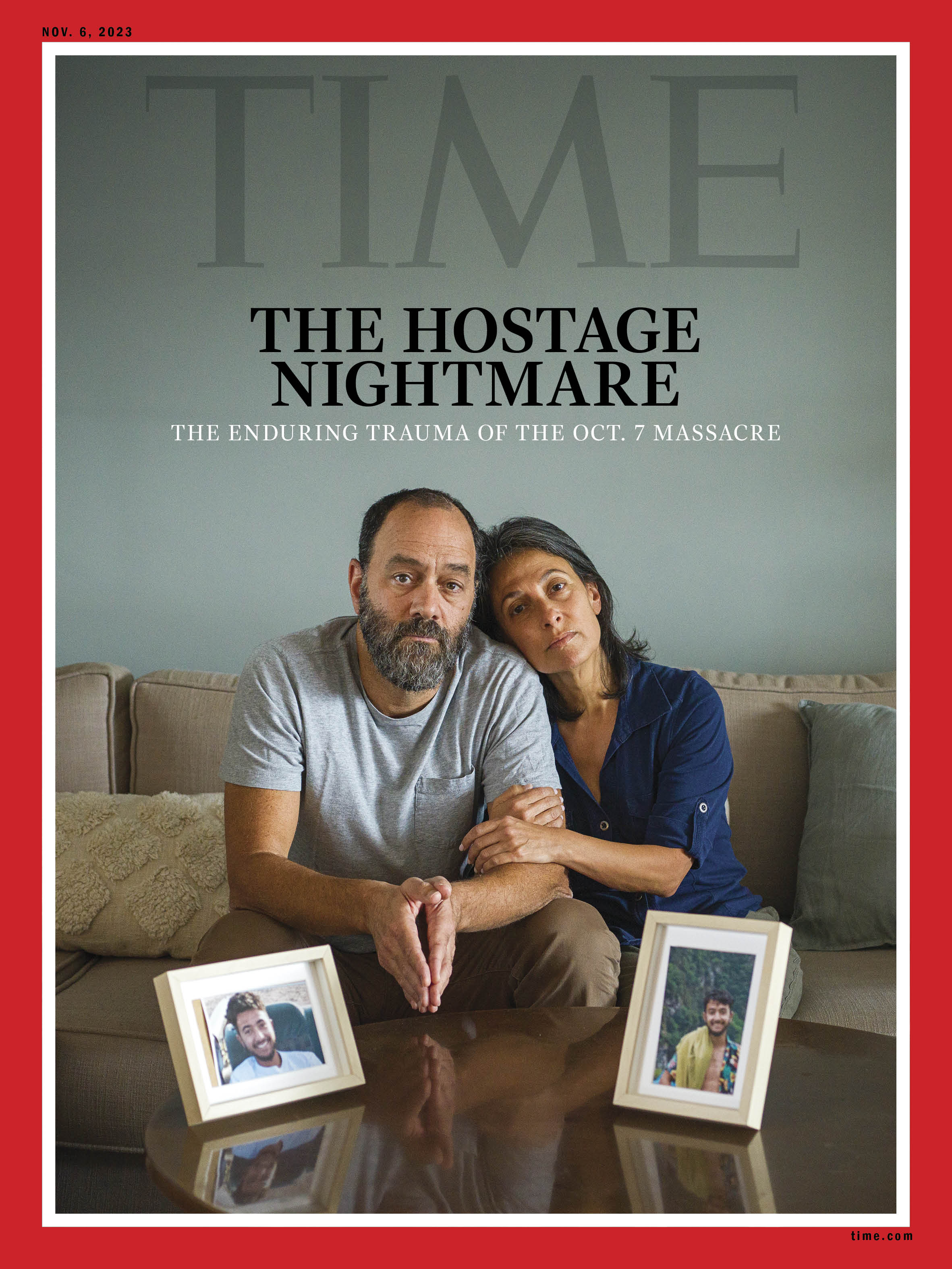
The scene as recounted by Eyal Nouri is almost too painful to tell: his uncle, Said Moshe, was killed in front of his aunt, Adina. His last sighting of Adina is from a photograph posted online: “You see her on a motorcycle,” Eyal says. "She’s sitting in the middle between the two terrorists. Think about the situation. A few minutes ago she saw her husband, the one that she loved for the last 50 years, murdered in front of her eyes, and now they’re taking her to an unknown place in the Gaza Strip.”
Adina Moshe, 72, is believed to be one of nearly 200 hostages taken by Hamas following the Oct. 7 Massacre, which killed at least 1,400 people in Israel. It was, as TIME’s Karl Vick wrote in the hours after the attack, Israel’s Sept. 11, the worst act of violence committed against Jews since the Holocaust.
Events are moving fast in the Middle East as we close this week’s cover story. President Biden arrived Wednesday. Hundreds of people are feared dead following an explosion at a Gaza City hospital Tuesday. Diplomats are working to create a humanitarian safe zone in Gaza while Israeli airstrikes continue. Thousands of people have been killed in the Gaza Strip since Oct. 7, Palestinian health authorities said Wednesday, and hundreds of thousands of Palestinians are trying to evacuate, though many have nowhere safe to go. As these events throttle forward, we felt it was important to stop, and to listen, to hear from the family members of those who were taken on Oct. 7.
In recent days, TIME reporters, editors, photo, video journalists, and contributors have worked around the clock to gather the voices of the families whose relatives have been taken hostage by Hamas. Their stories are assembled here, along with this week’s cover, which features Rachel Goldberg and Jonathan Polin, whose son Hersh Goldberg-Polin, age 23, is, like Adina Moshe, believed to be among the hostages.
Read more: The Families of Israelis Held Hostage by Hamas Speak Out
Keren Schem’s daughter Mia, 21, was taken from the Nova music festival. Schem has not heard from her daughter since the attack. On Oct. 16, Hamas released a video of Mia. “I want to tell Mia if she hears me: I will do everything I can,” Keren Schem told TIME. “And if they hear, our cruel enemy, I’m telling them now: you can come here and you can take me. Bring my daughter home. She is only an innocent child. Take me and bring my daughter home.”
The pain of uncertainty echoes across these interviews.
“Not knowing is the worst thing,” says Ahal Besorai, whose sister and her family are missing after the attack on Kibbutz Be’eri. “There’s no sense of finality; as human beings, this is what we crave. There is some sense of relief in completeness, even if it’s bad.”
At TIME, our mission is to tell the stories that shape the world. The journalists covering this have been conducting some of the most painful interviews of their careers. This is their duty, as it is for our colleagues throughout the industry who are risking their lives every day to tell these stories. For decades, TIME has covered the tragedy and complexity of the Israeli-Palestinian conflict. We will continue telling all of these stories. That is our duty too.
The Israeli philosopher Yuval Noah Harari wrote for TIME this week a piece that is at once a history of this moment and a plea to the world. “It is the job of outsiders to help maintain a space for peace,” Harari writes. “We deposit this peaceful space with you, because we cannot hold it right now. Take good care of it for us, so that one day, when the pain begins to heal, both Israelis and Palestinians might inhabit that space.”
These families of the hostages are shattered. Their world is shattered. We hope sharing their stories can help hold that space for peace and begin the necessary work of repairing the world.
More Must-Reads from TIME
- Cybersecurity Experts Are Sounding the Alarm on DOGE
- Meet the 2025 Women of the Year
- The Harsh Truth About Disability Inclusion
- Why Do More Young Adults Have Cancer?
- Colman Domingo Leads With Radical Love
- How to Get Better at Doing Things Alone
- Michelle Zauner Stares Down the Darkness
Write to Sam Jacobs at sam.jacobs@time.com